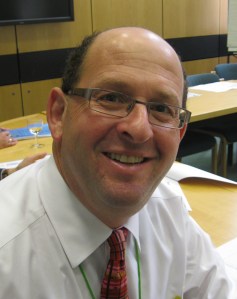
Money was a focus for last week’s session as the success of devolution will rest upon this. Key questions include:
- Is there enough?
- Does devolution to ten areas make economic sense?
- Who has control of it?
- Where does this control rest?
- How do citizens influence these decisions?
- How is City Council money used to make a difference and bring added value?
Paul Dransfield the Strategic Director of Corporate Resources attended with Sukvinder Kalsi to explain how his officers would help. He assured the councillors that his team would be ensuring that District Committees gettimely financial information in future to help with budgeting.

Paul Dransfield, Strategic Director Corporate Resources
There are a set of services, including rubbish collection, recycling and street cleansing which District Committees hold the budget for, but don’t feel they have any real control. The services are actually delivered on a city-wide basis and managed through service level agreements. Local councillors argue that there is no way to withhold funding or hold the service to account if the service is inadequate. The review of the history of devolution indicated that this concern has been part of the way structures were set up from the beginning. It is obviously still an area that needs to be resolved.
Another financial issue discussed included council housing finance. Paul’s final area of discussion was about the Council’s assets. He explained that officers are working to build a better understanding of the buildings that Districts are responsible for and the opportunities and risks they provide.
Next on was another Strategic Director – Mark Barrow – from the Development Directorate. The Directorate has responsibility for lanning, growth and jobs in Birmingham. Its activities will not be devolved. That is the budgets will not be held by the Districts and the staff will remain accountable to the Cabinet Member, Cllr Ali. So the challenge is how a service such as that adapts to the devolution agenda.
These services have connections with thousands of people and organisations (such as businesses) across the city and could use this connectivity to help support local partnerships.

Mark Barrow, Strategic Director Corporate Resources
Even though it remains a centralised service the Director recognised that:
The closer you get to the decision-making and the impact of the decision the better the quality of the decision.
The previous week Councillor John Cotton had talked of the need for devolution to be about changing the map of deprivation. On that basis amongst the most pressing needs in some communities are jobs and skills. So it’s clear that even if Districts do not have direct responsibility for what the Council is doing to achieve this they need to work closely with this Directorate. Similarly, the Directorate needs to support and listen to Districts. The ways this will happen in practice will become clearer during this transitional year. As the Director suggested:
It’ll be a bit of a discovery.
Procurement refers to the ways in which the Council acquires goods and services. One argument for devolution is that Districts will, in the long term, be able to procure different services to meet local needs. The Head of Corporate Procurement Nigel Kletz pointed out that it is often most cost effective to procure a single contract across the whole city. Certainly the most expensive way forward would be to break every contract down into ten. However, bundling groups of services together within a district could be effective. In the future decisions will need to be made on a case by case basis.

Nigel Kletz, Assistant Director Corporate Resources
Finally, Sharon Lea, the Strategic Director of Environment and Culture talked about the needs for champions to make devolution work. She argued that within Districts councillors and officers will need to be strong champions and hold other parts of the Council to account as it has to be:
A one-council agenda.
She explained that a new Local Services Directorate is being created to bring together some 8000 council staff working in localities and those supporting them strategically.
The new Directorate will create a locality focus for the Council’s services. Citizen engagement will be important. Staff will be helped by the imminent launch of the Chamberlain Forum toolkit on supporting neighbourhood forums, which are one way for residents to have a representative and collective voice when dealing with the Council and other organisations.
Once again this blog does not signal any decisions by the City Council. The aim is to capture some of the discussions taking place and the options being considered. It’s clear that there’s a lot of work to be done during this transitional year to ensure that practical issues are resolved to so that the Council can have a real locality focus in the future.









